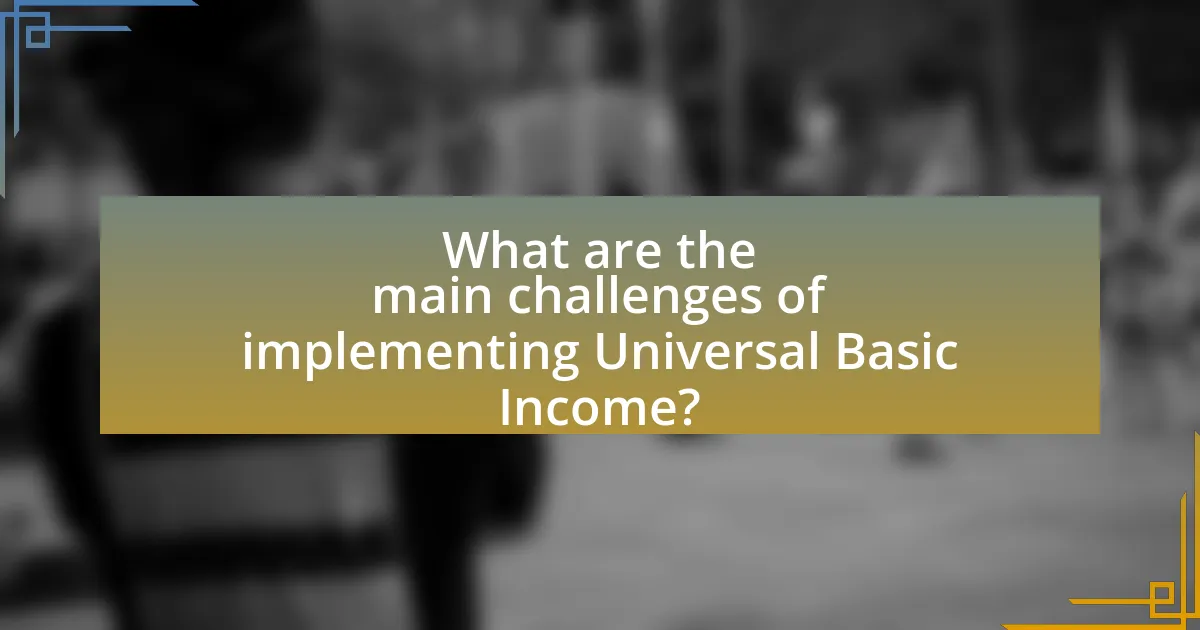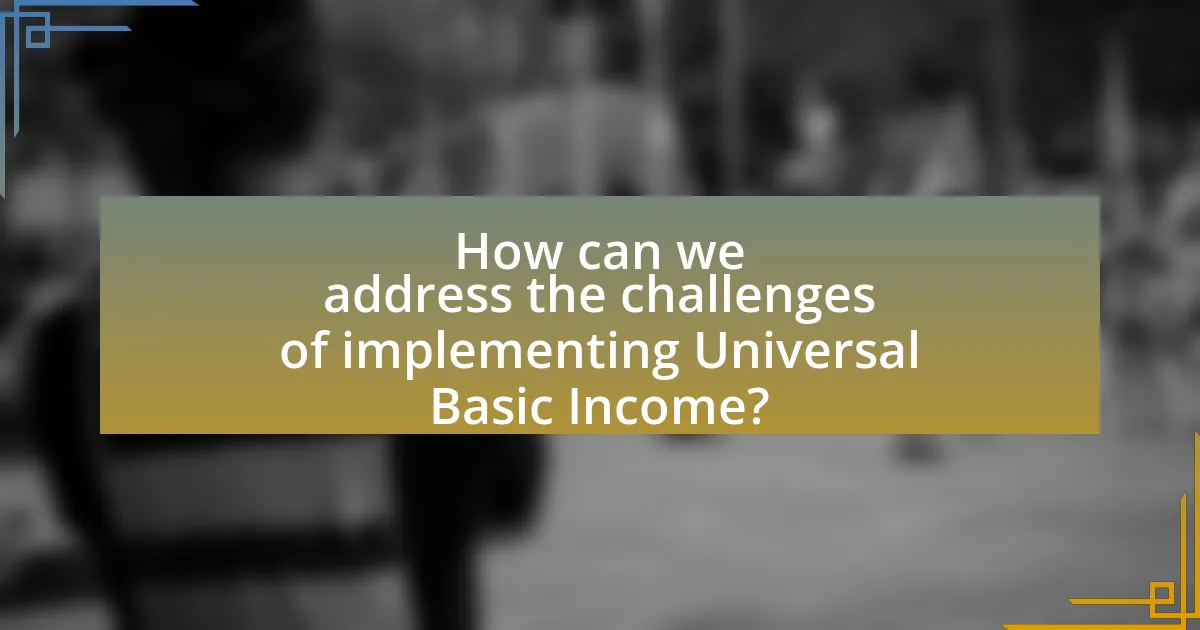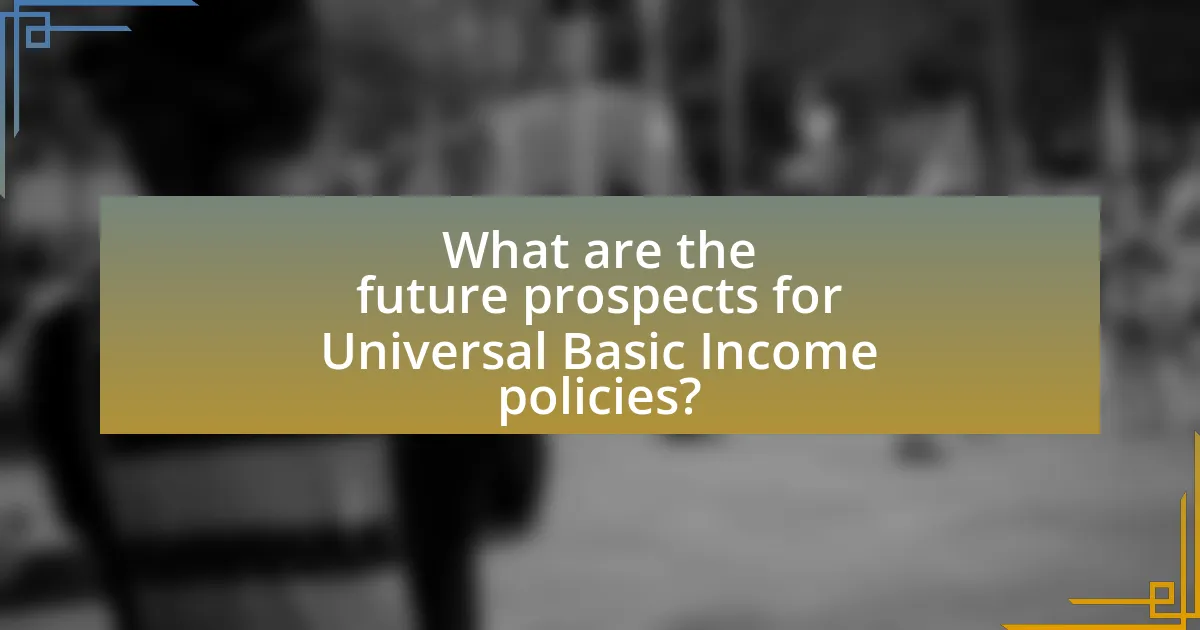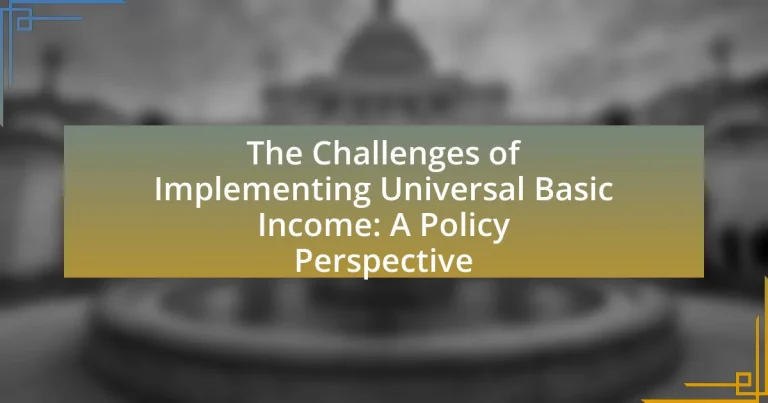The article examines the challenges associated with implementing Universal Basic Income (UBI), focusing on funding sustainability, potential inflation, and political feasibility. It highlights the significant financial resources required for UBI, estimated at trillions annually, and discusses the implications of economic feasibility on its viability. The article also addresses social implications, such as poverty reduction and work incentives, while exploring the role of interest groups and public perceptions in shaping UBI policies. Additionally, it outlines best practices for implementation, including stakeholder engagement and the use of technology to enhance efficiency and accessibility.

What are the main challenges of implementing Universal Basic Income?
The main challenges of implementing Universal Basic Income (UBI) include funding sustainability, potential inflation, and political feasibility. Funding sustainability poses a significant issue as UBI requires substantial financial resources; estimates suggest that providing a basic income to all citizens could cost trillions annually, necessitating new tax structures or reallocating existing budgets. Potential inflation arises from increased consumer spending, which could drive up prices, diminishing the purchasing power of the UBI itself. Political feasibility is another challenge, as UBI faces opposition from various interest groups and requires broad political consensus to enact and maintain, evidenced by the mixed outcomes of UBI trials in places like Finland and California.
How does economic feasibility impact the implementation of Universal Basic Income?
Economic feasibility significantly impacts the implementation of Universal Basic Income (UBI) by determining whether a government can sustainably fund the program without adverse economic consequences. For instance, estimates suggest that implementing UBI in the United States could cost approximately $3 trillion annually, which raises concerns about funding sources, potential tax increases, and the effects on inflation and public services. Countries like Finland and Canada have conducted pilot programs, revealing that while UBI can reduce poverty and improve well-being, the economic feasibility hinges on careful budget allocation and the ability to generate sufficient revenue. Thus, without a solid economic foundation, the viability of UBI as a long-term policy remains questionable.
What are the estimated costs associated with Universal Basic Income programs?
The estimated costs associated with Universal Basic Income (UBI) programs vary significantly based on the design and implementation of the program. For instance, a UBI providing $1,000 per month to every adult in the United States could cost approximately $3 trillion annually. This figure is derived from calculations that consider the total adult population and the monthly payment amount. Additionally, studies such as the one conducted by the Roosevelt Institute suggest that a UBI could stimulate economic growth, potentially offsetting some of the costs through increased consumer spending and tax revenues.
How do funding sources affect the sustainability of Universal Basic Income?
Funding sources significantly impact the sustainability of Universal Basic Income (UBI) by determining the financial viability and long-term implementation of the program. For instance, UBI funded through progressive taxation can create a more equitable system, as higher earners contribute more, potentially leading to greater public support and stability. Conversely, reliance on volatile sources such as carbon taxes or economic growth can jeopardize UBI’s reliability, as fluctuations in these revenues may lead to funding shortfalls. Research indicates that countries like Finland, which explored UBI trials, faced challenges in sustainability due to unclear funding mechanisms, highlighting the necessity for stable and predictable revenue streams to ensure ongoing support for UBI initiatives.
What social implications arise from Universal Basic Income implementation?
Universal Basic Income (UBI) implementation can lead to significant social implications, including reduced poverty levels and increased economic security. Research indicates that UBI can alleviate financial stress for low-income individuals, thereby improving mental health and overall well-being. For instance, a study conducted in Finland during a UBI trial showed that recipients reported higher life satisfaction and lower stress levels compared to non-recipients. Additionally, UBI may foster greater social cohesion by reducing income inequality, as it provides a financial safety net for all citizens, promoting a sense of community and shared responsibility. Furthermore, UBI can encourage individuals to pursue education and entrepreneurial activities, as financial stability allows for greater risk-taking and investment in personal development.
How might Universal Basic Income influence work incentives?
Universal Basic Income (UBI) may reduce the incentive to work by providing a guaranteed income regardless of employment status. This financial security can lead some individuals to prioritize leisure or personal projects over traditional employment, as evidenced by pilot programs in places like Finland, where participants reported increased well-being but varied in their job-seeking behaviors. Conversely, UBI could also encourage entrepreneurship and part-time work, as individuals may feel more secure in pursuing their passions without the immediate pressure of financial survival. Studies, such as those conducted by the Roosevelt Institute, suggest that UBI could stimulate economic activity by allowing people to invest in education or start businesses, potentially offsetting any negative impacts on work incentives.
What are the potential effects on poverty and inequality?
Universal Basic Income (UBI) has the potential to significantly reduce poverty and inequality by providing a guaranteed income to all individuals, regardless of their employment status. Studies indicate that UBI can lift people above the poverty line; for instance, a pilot program in Finland showed that recipients reported improved well-being and reduced financial stress. Additionally, UBI can address income inequality by redistributing wealth, as it provides a steady income floor that benefits lower-income households more than wealthier ones. Research from the Roosevelt Institute suggests that implementing UBI could increase GDP and create jobs, further alleviating economic disparities.
What political challenges are faced in the adoption of Universal Basic Income?
The political challenges faced in the adoption of Universal Basic Income (UBI) include opposition from various political factions, concerns about funding, and the potential impact on existing welfare programs. Political factions, particularly conservative groups, often argue that UBI could disincentivize work and lead to increased government dependency. Additionally, the funding of UBI raises significant concerns, as estimates suggest that implementing a comprehensive UBI could cost trillions annually, leading to debates over tax increases or reallocating existing budgets. Furthermore, there is apprehension regarding the displacement of current welfare programs, as stakeholders worry that UBI might replace essential services rather than complement them, creating resistance from those who benefit from existing systems. These challenges highlight the complex political landscape surrounding UBI implementation.
How do public perceptions and political ideologies shape the debate on Universal Basic Income?
Public perceptions and political ideologies significantly shape the debate on Universal Basic Income (UBI) by influencing how individuals and groups view its feasibility and desirability. For instance, those with progressive ideologies often advocate for UBI as a means to reduce poverty and inequality, citing studies like the one conducted by the Roosevelt Institute, which suggests that UBI could stimulate economic growth by increasing consumer spending. Conversely, conservative perspectives may frame UBI as a disincentive to work, arguing that it could lead to increased dependency on government support, as highlighted in research from the Cato Institute. These differing viewpoints create a polarized debate, where public opinion is swayed by media narratives, political rhetoric, and personal experiences with welfare systems, ultimately affecting policy proposals and implementation strategies for UBI.
What role do interest groups play in influencing Universal Basic Income policies?
Interest groups play a significant role in influencing Universal Basic Income (UBI) policies by advocating for specific interests, mobilizing public support, and shaping the political discourse surrounding UBI. These groups, which can include labor unions, social justice organizations, and economic think tanks, often conduct research and disseminate information that highlights the potential benefits of UBI, such as poverty reduction and economic stability. For instance, the Economic Security Project has provided evidence and case studies demonstrating how UBI can alleviate financial insecurity, thereby influencing policymakers to consider UBI proposals. Additionally, interest groups engage in lobbying efforts to persuade legislators to adopt UBI initiatives, often leveraging public opinion data that shows growing support for such policies. This multifaceted approach allows interest groups to significantly impact the formulation and implementation of UBI policies.

How can we address the challenges of implementing Universal Basic Income?
To address the challenges of implementing Universal Basic Income (UBI), policymakers can adopt a phased approach that includes pilot programs, stakeholder engagement, and robust funding mechanisms. Pilot programs, such as those conducted in Finland and Canada, provide valuable data on UBI’s effects on poverty and employment, allowing for adjustments before nationwide implementation. Engaging stakeholders, including economists, social workers, and the public, fosters a comprehensive understanding of UBI’s implications and builds support. Additionally, establishing sustainable funding sources, such as reallocating existing welfare budgets or implementing progressive taxation, ensures the financial viability of UBI. These strategies collectively mitigate the challenges associated with UBI implementation, as evidenced by successful trials and studies indicating positive social outcomes.
What policy frameworks can support the successful implementation of Universal Basic Income?
Comprehensive policy frameworks that can support the successful implementation of Universal Basic Income (UBI) include fiscal policies, regulatory frameworks, and social safety nets. Fiscal policies must ensure sustainable funding sources, such as progressive taxation or reallocating existing welfare budgets, to provide the necessary financial resources for UBI. Regulatory frameworks should establish clear guidelines for UBI distribution, eligibility criteria, and integration with existing social programs to avoid overlaps and inefficiencies. Additionally, enhancing social safety nets can help mitigate potential negative impacts on labor markets and ensure that vulnerable populations are protected during the transition to UBI. Evidence from pilot programs, such as the Finnish UBI experiment, indicates that well-structured frameworks can lead to positive outcomes in employment and well-being, reinforcing the importance of these policy elements in successful UBI implementation.
How can pilot programs inform broader Universal Basic Income policies?
Pilot programs can inform broader Universal Basic Income (UBI) policies by providing empirical data on the effects of cash transfers on various socioeconomic factors. For instance, pilot programs like the Stockton Economic Empowerment Demonstration in California revealed that recipients experienced improved financial stability, increased employment rates, and enhanced mental health outcomes. These findings support the argument for UBI by demonstrating its potential to alleviate poverty and stimulate local economies. Additionally, pilot programs can highlight implementation challenges, such as administrative costs and public acceptance, which are critical for policymakers to address when designing comprehensive UBI frameworks.
What lessons can be learned from countries that have experimented with Universal Basic Income?
Countries that have experimented with Universal Basic Income (UBI) demonstrate several key lessons regarding its implementation and effects. First, UBI can reduce poverty and improve financial security, as evidenced by Finland’s trial, which showed that recipients reported higher well-being and less stress compared to non-recipients. Second, UBI does not significantly disincentivize work; in the Alaska Permanent Fund Dividend program, studies indicated that the majority of recipients continued to work, suggesting that UBI can coexist with employment. Third, administrative simplicity is crucial; programs like the one in Stockton, California, highlighted that direct cash transfers are more efficient than complex welfare systems. Lastly, public acceptance and political will are essential for sustainability, as seen in various trials where community engagement played a vital role in garnering support. These lessons underscore the importance of careful design and community involvement in UBI initiatives.
What role does technology play in facilitating Universal Basic Income?
Technology plays a crucial role in facilitating Universal Basic Income (UBI) by enabling efficient distribution and management of funds. Digital payment systems, such as mobile banking and blockchain technology, allow for quick and secure transactions, ensuring that recipients receive their payments directly and without delay. For instance, countries like Finland and trials in the United States have utilized digital platforms to streamline UBI disbursements, demonstrating that technology can reduce administrative costs and improve accessibility. Furthermore, data analytics can help policymakers assess the impact of UBI programs, allowing for adjustments based on real-time feedback and economic conditions. This integration of technology not only enhances the operational efficiency of UBI but also supports transparency and accountability in the distribution process.
How can digital payment systems enhance the efficiency of Universal Basic Income distribution?
Digital payment systems can enhance the efficiency of Universal Basic Income (UBI) distribution by enabling faster, more secure, and transparent transactions. These systems facilitate immediate fund transfers to recipients, reducing delays associated with traditional banking methods. For instance, a study by the World Bank indicates that digital payments can lower transaction costs by up to 90%, making it economically viable to distribute UBI to a larger population. Additionally, digital payment platforms provide real-time tracking and reporting, which enhances accountability and reduces the risk of fraud. This transparency is crucial for maintaining public trust in UBI programs, as evidenced by successful implementations in countries like Finland, where digital payments streamlined the distribution process and improved recipient satisfaction.
What innovations can reduce administrative costs associated with Universal Basic Income?
Innovations that can reduce administrative costs associated with Universal Basic Income (UBI) include the use of blockchain technology, automated eligibility verification systems, and digital payment platforms. Blockchain technology can streamline the distribution process by providing a secure and transparent ledger for transactions, which minimizes the need for intermediaries and reduces fraud, as evidenced by pilot programs in countries like Georgia and Estonia. Automated eligibility verification systems can utilize data from existing government databases to determine recipient eligibility, significantly cutting down on administrative labor and costs; for instance, the implementation of such systems in various welfare programs has shown to reduce processing times by up to 50%. Digital payment platforms, such as mobile wallets, can facilitate direct transfers to recipients, lowering transaction costs and improving efficiency, as demonstrated by the successful deployment of mobile payment systems in countries like Kenya with M-Pesa.

What are the future prospects for Universal Basic Income policies?
The future prospects for Universal Basic Income (UBI) policies are increasingly favorable as more governments and organizations explore their implementation. Recent pilot programs, such as those in Finland and Stockton, California, have demonstrated positive outcomes, including reduced poverty and improved mental health among recipients. Additionally, growing concerns about automation and job displacement are driving interest in UBI as a potential solution to economic inequality. Research from the Roosevelt Institute indicates that a UBI could stimulate economic growth by increasing consumer spending. These factors suggest that UBI policies may gain traction in the coming years as a viable response to contemporary economic challenges.
How might economic trends influence the viability of Universal Basic Income?
Economic trends significantly influence the viability of Universal Basic Income (UBI) by affecting funding sources and public support. For instance, rising automation and job displacement can create a stronger case for UBI as a means to provide financial security for those affected, evidenced by studies indicating that up to 800 million jobs could be lost globally to automation by 2030. Conversely, economic downturns may limit government budgets, making UBI less feasible; during the 2008 financial crisis, many countries faced austerity measures that curtailed social spending. Additionally, inflation trends can impact the purchasing power of UBI, necessitating adjustments to maintain its effectiveness. Thus, the interplay of these economic factors directly shapes the practical implementation and sustainability of UBI initiatives.
What impact will automation and AI have on the demand for Universal Basic Income?
Automation and AI will significantly increase the demand for Universal Basic Income (UBI) as they displace traditional jobs and create economic instability. Studies indicate that automation could replace up to 47% of U.S. jobs within the next two decades, leading to widespread unemployment and underemployment. This job displacement necessitates a safety net like UBI to ensure basic living standards for those affected. Furthermore, as AI continues to enhance productivity, wealth concentration may rise, exacerbating income inequality and further driving the need for UBI as a means to redistribute wealth and provide financial security.
How could changing labor markets affect public support for Universal Basic Income?
Changing labor markets could significantly increase public support for Universal Basic Income (UBI) as job displacement due to automation and gig economy growth raises concerns about economic security. As traditional employment opportunities decline, individuals may perceive UBI as a necessary safety net to ensure financial stability. For instance, a report by the McKinsey Global Institute estimates that up to 375 million workers globally may need to switch occupational categories due to automation by 2030, highlighting the urgency for alternative income solutions like UBI. This shift in labor dynamics can lead to a broader acceptance of UBI as a viable policy to address the challenges posed by an evolving job landscape.
What best practices can guide the implementation of Universal Basic Income?
Best practices for implementing Universal Basic Income (UBI) include ensuring adequate funding, establishing clear eligibility criteria, and conducting pilot programs to assess impacts. Adequate funding can be achieved through progressive taxation or reallocating existing welfare budgets, as evidenced by the Alaska Permanent Fund, which distributes oil revenue to residents. Clear eligibility criteria help target the most vulnerable populations, ensuring that UBI effectively reduces poverty. Pilot programs, such as those conducted in Finland and Stockton, California, provide valuable data on UBI’s effects on employment, health, and well-being, demonstrating its potential benefits and informing broader implementation strategies.
What strategies can ensure equitable access to Universal Basic Income?
To ensure equitable access to Universal Basic Income (UBI), implementing a targeted outreach strategy is essential. This strategy should focus on identifying and engaging marginalized communities, ensuring they are informed about UBI programs and how to apply. For instance, research indicates that targeted outreach can increase participation rates among low-income households by up to 30%, as seen in pilot programs in various regions. Additionally, simplifying application processes and providing assistance in multiple languages can further enhance accessibility. Evidence from UBI trials, such as the one conducted in Finland, shows that reducing bureaucratic barriers significantly improves enrollment and retention rates among eligible populations.
How can stakeholder engagement improve the design of Universal Basic Income programs?
Stakeholder engagement can significantly enhance the design of Universal Basic Income (UBI) programs by ensuring that diverse perspectives and needs are incorporated into the policy framework. Engaging stakeholders, including beneficiaries, policymakers, and community organizations, allows for the identification of potential challenges and opportunities that may not be apparent to program designers. For instance, research conducted by the Roosevelt Institute highlights that inclusive stakeholder participation can lead to more equitable and effective UBI models, as it fosters a deeper understanding of the socioeconomic contexts in which these programs operate. This collaborative approach can also increase public support and trust in UBI initiatives, as stakeholders feel their voices are heard and their concerns addressed.


